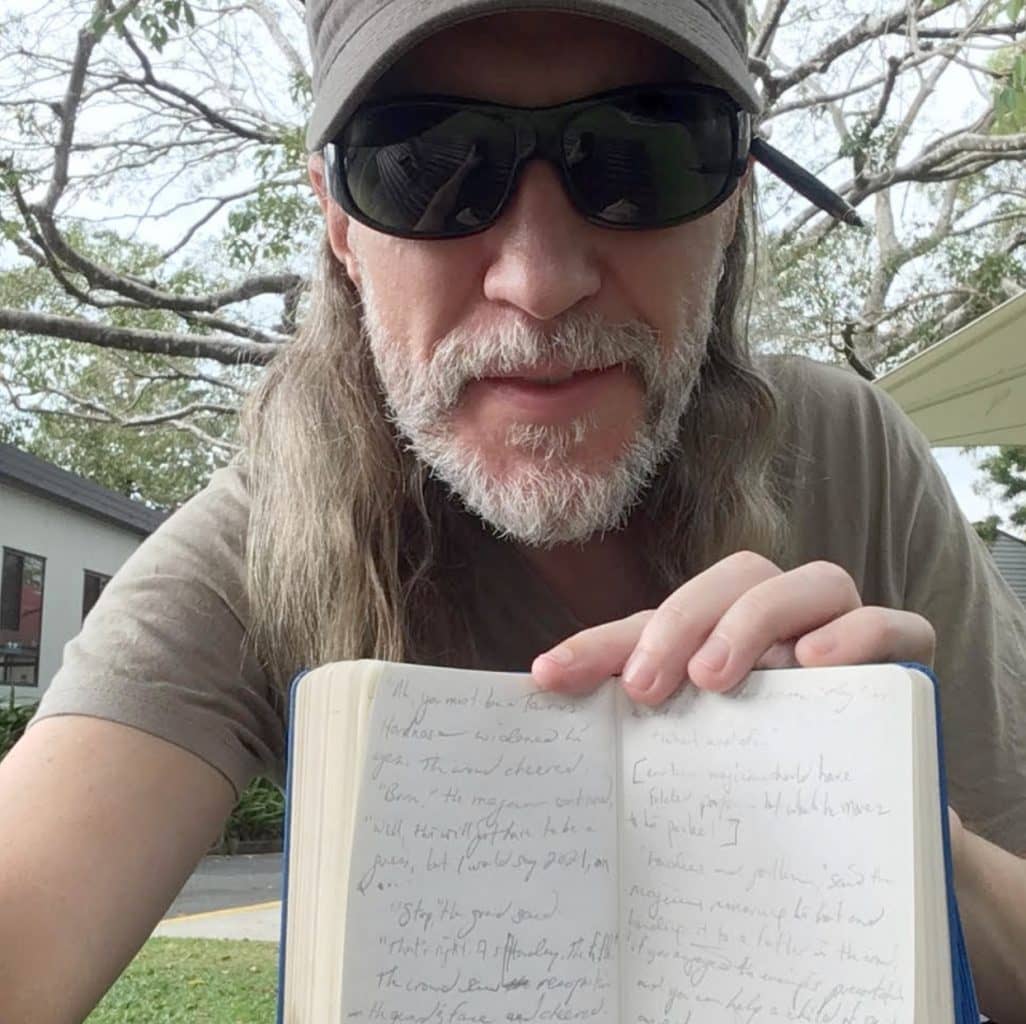
Seriously. I never want to experience what she went through.
I’ve gone through a few illnesses myself over the past few years. As a result, the challenge of maintaining cognitive fitness has been on my mind even more.
Make no mistake:
As a memory expert nearing his 50th year, finding time and energy for the strategies I’m about to share with you today is a challenge. Especially since I still work daily.
On top of that, I feel the pressure of demonstrating better memory, not just talking about it.
But the challenge of getting enough cognitive exercise is not a surmountable one. Especially when you’re willing to combine the best scientific findings with common sense and a willingness to experiment.
Ready to go through my science-backed suggestions and learn a bit more of what I’m doing as a practitioner of the ancient art of memory?
Let’s dive in!
Why Cognitive Decline Happens
We all know that knowledge is power, so let’s take a moment to understand why even healthy people can wind up suffering cognitive issues that reduce their memory abilities.
In almost every case, it’s not your fault if you’re starting to forget things you want to remember. But it is your responsibility to educate yourself and take appropriate action to improve any downturn you’re expecting.
Here are some of the first places to look if you’re starting to feel your mental fitness slip.
One: Biological Factors
Scientists know that Alzheimer’s can’t always be prevented. That’s because one type of the illness stems from hereditary factors. Your genetics can even have an effect on your brain’s synaptic plasticity.
That means that even though you really can rewire your brain in many circumstances, for some people, genetics might place a limit on exactly how much improvement is possible.
That’s no reason not to make your best effort, however. Key biological influences that anyone can take into account and work on improving include:
- Reducing inflammation
- Addressing hormonal fluctuations
- Tackling oxidative stress
- Removing negative environmental influences
Personally, I’ve made it a point to address inflammation by removing all foods that cause it in my body. That includes removing some foods known to improve memory.
I really don’t like not eating walnuts, for example, but there are other ways I’ve found to use diet positively in the context of my personal biological situation. Teas for memory have a strong place in my diet, along with a few herbs.
Naturally, you need to consult a doctor before taking any specific action. That’s what I’ve always done, along with doing my own research in combination with using critical thinking skills.
Two: Lifestyle Factors
I mentioned that I’m still working. That’s not much of a problem.
How exactly I work is a different issue, however, and one that I’ve needed to change. You might need to alter your work load as well.
To give you a sense of how my daily life used to be, I basically spent most of the day on the computer. For a few years, I read in bed using the Kindle app on my phone.
As I started to notice my memory slipping, I needed to make sure to get out on more daily walks and impose a computer curfew.
I’m glad I did. It’s done a lot to reduce digital amnesia in my life and help improve the tonic and phasic dopamine levels in my brain.
Three: Psychological Factors
As I shared in The Victorious Mind, my battle against depression carries on. Many millions of others are in the same boat.
There’s no doubt in my mind that depression messes with my ability to remember. That’s why I’m so glad I’ve been able to reduce it.
On top of addressing any depression you may be dealing with, make sure to attend to your stress and anxiety. Both have been shown to cause cognitive issues.
What You Can Do About Cognitive Decline And Memory Loss
(These Activities Actually Work)
Now that we’ve got a sense of what causes brain blips and other issues related to mind and memory, let’s focus on what you can do about it.
I’ll only share activities I have personal experience with, all of which are backed by science.
They’re also based on common sense and my belief that skepticism is a good thing, especially when it comes to claims some people make about memory training.
By the same token, my TEDx Talk has been so popular precisely because I’ve been willing to try some cognitive activities that I was skeptical about. It would be naive not to combine research with personal experimentation. In some cases, I wish I hadn’t waited so long to give some of these powerful activities a try.
Obviously, not all activities suit all people. All I can ask as you go through this list is that you keep an open mind. Sometimes you need to lean into your resistances, just like I did.
Strategy One: Read Outside Of Your Comfort Zone
Many people fall into familiar patterns as they age. I’ve noticed this myself: a strange longing and nostalgia for the past.
The problem with giving into the need for creature comforts is that your biological levels of arousal flatline. This effect has been shown by what is now called the Yerkes-Dodson Law.
It’s at the core of what I’ve come to call “balancing the Challenge-Frustration Curve.”
Basically, you want to take caution around doing too many easy things. Learn new things that challenge you. Just make sure that you don’t run into the new area so fast and so far that you wind up overwhelmed and frustrated.
There’s no hard-and-fast rule around how exactly to optimally balance challenge so that you avoid frustration. But when I’ve taught people how to read faster, I give them the Cornucopia Book exercise.
In brief, you find the most authoritative book you can find and read it, even when you find it challenging. Then, you read at least two of the other books or articles cited by the book you chose. I’ve done this with physics, aspects of history and aspects of math I thought I’ve never be able to commit to memory, let alone understand.
Yet, year after year, I read with momentum, and continue practicing my re-reading strategy. Combining new reading that presents mental challenges with revisiting old texts creates a kind of bibliotherapy, which is an actual term used in clinical settings.
Strategy Two: Keep Multiple Journals
One thing I’ve noticed as I deal with an increasing number of spreadsheets and statistical graphs related to me work is that I find change logs challenging to understand. They’re even harder to interpret and use for making decisions.
Sure, you can change the date range with a few clicks. Google’s ad platform lets you annotate the graphic readouts you get and some people delight in analyzing the columns.
Not me. And for awhile, it was getting so bad, I avoided them completely. To lean into the challenge and find a way to keep sharp and competitive, I started to write out the key information from charts and graphs by hand in a physical journal.
The funny thing is that I find it faster than using the online note taking and annotation tools. It also makes the tasks more meaningful.
Other progress journals I’ve kept include:
- Basic journaling for self-improvement
- Specific journaling tactics for developing mental strength
- The Freedom Journal for language learning
More and more, I lean into this cognitive activity. I know a lot of people want to avoid clutter, and there’s no doubt tools like Evernote and Obsidian are great for that. But they’re not right for me and chances are if you’re struggling, they not right for you either.
So whether it’s for lifelong learning goals or tracking the dietary changes you might need to fend off brain fog, consider keeping multiple journals.
Strategy Three: Dose Yourself In Art, Music & Movement
Just about everyone knows that learning to play an instrument is good for your brain.
Sadly, many of the people who would benefit the most have convinced themselves that they can’t learn to play one.
Yet, as Gary Marcus showed in his excellent book, Guitar Zero, it is possible to pick up an instrument and succeed with it. There are a lot of music mnemonics that can help with everything from learning the notes of your strings, to remembering key signature changes and understanding the circle of fifths.
If music doesn’t appeal to you, consider taking an art class, dance or learn some yoga moves (there are even a few that are good for memory).
Each of these exercises will steep you in deliberate practice which will exercise your procedural memory. And that’s a key point. Although they provide some intellectual activity, they’re primarily helping you exercise the motor function areas of your brain. This is because your implicit memory gets engaged and you don’t really have much time for thinking using explicit memory functions.
Personally, I practice Qigong almost every day, draw frequently and take on new musical challenges, like memorizing pieces from Bach. Here’s a quick performance of one of them I played for you on bass guitar:
The best part of all these performance-based activities is not just that they give you great cognitive exercise. They also expand without end. There’s always more to learn about each field.
You can also combine each musical and artistic practice with challenging reading. The more you get into a topic, the more you’ll find granular scientific discussion that will stretch your mind and memory.
Strategy Four: Keep Socially Active (But Only With The Right People)
It’s well-known that socializing helps keep your brain active.
However, a recent study has shown that stress is truly disastrous for your memory.
With this knew knowledge in hand, it’s more important than ever that if you’re going to socialize, the people need to help reduce your stress, not increase it.
For some people, this might mean changing careers in order to save your cognitive well-being. I know that some people escape into online brain games to take a break from negative colleagues, but that strategy might not pay off in the end.
Personally, I’ve gone out of my way to create a circle of friends who share my interest in memory (including memory science), philosophy and language learning. I also have some gym friends who love physical fitness and walk often with my wife, during which we have fascinating conversations.
Upgrading my social circle also helped me to stop hanging around drinkers. I used to overindulge and alcohol is just not good at all for memory, especially when it comes to forming long-term memories.
Strategy Five: Pick A Language And Stick With It
Learning a new language provides you with a set of substantial challenges. Leaned into consistently, developing fluency is therefore one of the most likely ways to improve your concentration and boost your memory.
Not only that, but becoming bilingual has been shown to create cognitive reserve, something that protects your brain against dementia.
The key is to avoid dabbling. To be fair, even just a little bit of vocabulary memorization will provide some benefits. But for the best possible results, I suggest you spend at least a few hours a week on one or two languages.
To make the most out of the time spent, make sure to mix memorization with reading, writing, speaking and listening to the language. Even just fifteen minutes a day will be better than nothing. But if you can, make appointments with native speakers for longer amounts of exposure.
Strategy Six: Play Memory Games In Physical Space
Many people have asked me whether or not brain games actually work.
As usual, the answer depends on your exact goal. But generally, it’s fair to say that they don’t.
Instead, consider traditional pastimes, like the memory game I shared with you in this video using a simple deck of playing cards:
If you want to take things to the next level, you can learn to memorize playing cards. Many people find the challenge fantastic and the best part is that you can “restart” the challenge any time by simply shuffling the deck and starting again.
Another memory game you can play involves storytelling. Get a few friends together and have each provide a piece of a story.
As each person adds a piece, the next player has to provide everything that was previously added to the story. For example:
- Person 1: A rabbit visited Berlin
- Person 2: A rabbit visited Berlin and ate an orange
- Person 3: A rabbit visited Berlin and ate an orange with a museum guard
The goal is to keep going around adding details. The first person to make a mistake “loses.” Of course, no one loses at all because each player is getting fantastic memory exercise.
Finally, you can make sure to follow this blog. I’ve hosted my Memory Detective game in the past, and will do so again. It gives you both passive memory exercise (in the sense Dr. Gary Small discusses) and active memory exercise if you want to use memory techniques.
I’ll eventually release another game I currently have in testing, so watch this space.
Strategy Seven: Work On Your Memoirs
It’s hard for me to think of a mentally stimulating activity that gives memory a workout more than writing – except for writing your own memoir.
Sadly, some people are going to object that their lives aren’t interesting enough to commit to paper.
I disagree. Your life is incredibly interesting, and even if no one else agrees or reads your memoirs, the exercise will give your brain a fantastic workout.
On top of the reflective thinking writing about yourself provides, you get practice in objective and subjective thinking.
Another positive aspect here is that you’ll be creating value for others. Even if you just write a short personal history with a few bullet points about the things you’ve learned in life, someone you know will benefit from it.
Strategy Eight: Use Technology For Brain Health Wisely
Above, I suggested that I journal mostly by hand. That doesn’t mean I don’t make ample use of online technology for keeping my mind sharp, however.
For example, I sometimes use chatGPT for language learning. There are also plenty of online courses and MOOCs that I’ve used to supplement books. Even YouTube is a treasure-trove of online learning.
One thing I love to use YouTube for is memorizing long-form mantras. Currently I’m memorizing the Atma Bodha directly from this video. I have an English translation in print, but having the original Sanskrit to listen to helps me learn each line much faster.
The key is to apply the Memory Palace technique as much as possible to enable long-term retention of the information. In the case of meditation for better memory, this ancient memory technique is particularly useful.
Strategy Nine: Practice Memory-Based Meditation
Meditation is known to improve memory in many ways. It can improve visual short-term memory and improve working memory.
Then there’s other aspects of brain health offered by meditation, everything from stress reduction to emotional regulation.
The best meditation techniques I know for memory enhancement are simple:
- Sit in a quiet place on the floor or a chair
- Mentally follow your breath for 5-10 minutes
- Chant a mantra if you know one
- Practice a loving-kindness meditation (such as this one)
- Use a guided visualization if it helps
You can also exercise your memory by practicing visualisation exercises while meditating.
The key, as with all beneficial activities, is consistency, variety and ensuring that you maintain an environment that supports your decision to combine memory with meditation. The same thing is true for any and all cognitive activities you add to your routine.
Putting It All Together For Maximum Mental Sharpness As You Age
Sometimes when I share these activities with people, I’m astonished by how they struggle with the idea of fitting it all in.
As a busy person myself, I know how hard it can be. It only gets harder as we age and technology keeps providing us with more distractions.
I think change starts by honestly seeing the problem for what it is: a time management puzzle.
There’s nothing wrong with indulging in social media. It’s just a question of when you’re going to do it.
I suggest experimenting with making your mornings sacred. Before getting on any device, sit for a fifteen minute meditation. Then, spend the next fifteen minutes on a bit of language learning and journaling.
I’ve been talking about time-management for a long time, and it’s doable for anyone.
If I have an advantage, it’s simply that I spent a bit of time mastering my memory. There’s a specific way I did it and it’s all yours when you grab this free course:
In four videos and three simple worksheets, I’ll teach you the core memory skills and brain exercises you need to start feeling sharper.
That way, you’ll enjoy your life much more and be more resilient when new challenges arise.
Not only that, but you’ll remember what it takes to show up and solve new problems quickly.
And that’s what keeping your mind sharp is all about. Get started now and before you know, you’ll feel stronger in your mind and memory than you ever dreamed possible.
Related Posts
- Stoic Secrets For Using Memory Techniques With Language Learning
Christopher Huff shares his Stoic secrets for using memory techniques when learning a language. You'll…
- Brain Athlete: Does This Free Memory App Work?
The Brain Athlete App is perfect for training as you work on using Memory Palaces…
- Memory Athlete Braden Adams On The Benefits Of Memory Competition
Braden Adams is one of the most impressive memory athletes of recent times. Learn to…









